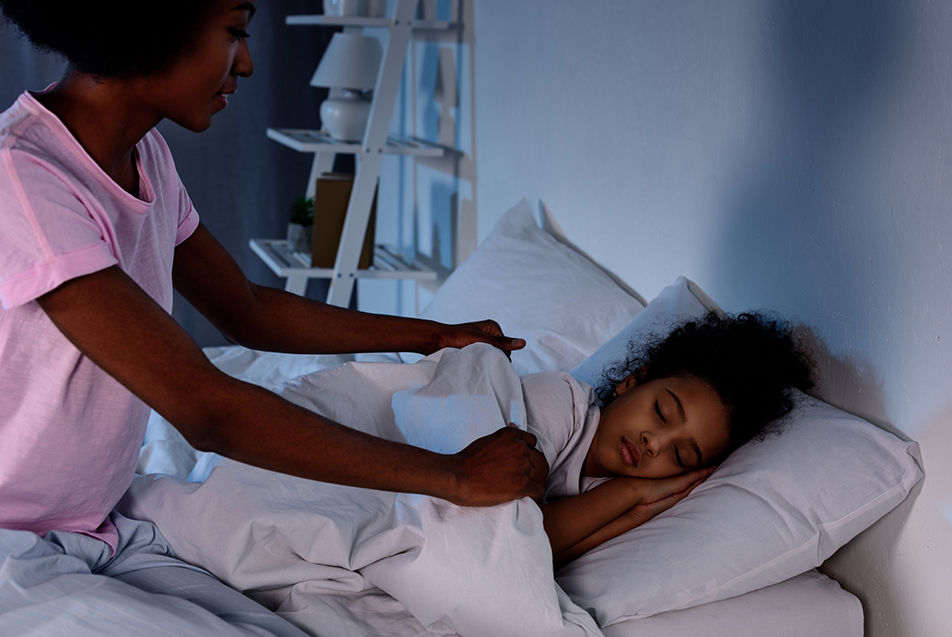
This post was written by Aaron Roberts, MD, PPG – Sleep Medicine.
I often get asked by concerned parents if their child has a sleep disorder. Is it normal for my child to wake up during the night? Why does my child keep crawling in bed with me after waking up? At what age are naps no longer required? To better understand if there is a potential problem, a parent must know what is considered “normal” and what is not.
In the past, I’ve shared the benefits of co-sleeping with your partner. There was even a follow up article with tips on how to accomplish this. While snuggling up with a loved one may confer benefits in adults, the exact opposite is true for children. This article will explore what to expect regarding children’s sleep, common pitfalls and how to promote healthy sleep.
Sleep Onset Association Disorder
Research has shown babies usually don’t have regular sleep cycles until about 6 months of age. According to the National Sleep Foundation, newborns need at least 14-17 hours of sleep per day, but only sleep for a couple hours at a time. Once they are sleeping through the night, they will wake up on average between 2-6 times per night. The vast majority will fall back asleep without any problems (if allowed). Well-meaning caregivers and first-time parents who immediately tend to their children every time they wake up can unintentionally create a sleep disorder known as Sleep Onset Association Disorder (SOAD).
Children with SOAD learn to associate something such as a behavior (rocking, nursing, car rides) or a person (mom, dad, babysitter) with falling asleep. When a child tries to go to bed or wakes up in the middle of the night without that association, he or she will not be able to fall asleep.
Treatment of this condition includes several behavioral interventions to break the association. First, try putting your baby to bed while drowsy but still awake. If you hear crying during the night, wait at least 5-10 minutes before responding to see if he or she can go back to sleep on their own. If the crying continues, think of what could be causing it, such as a dirty diaper, hunger or reflux, and address it appropriately. Try not to cause too much stimulation and keep your baby calm during nighttime feedings. Lastly, reserve the daytime for stimulating activities to help them stay awake during the day and tired at night.
Sleep hygiene
The most common pitfall that children and parents do to cause insomnia is practicing poor sleep hygiene. Sleep hygiene refers to good habits that promote healthy sleep. There are many environmental and social determinants that influence sleep hygiene, and most are modifiable behaviors. This means putting away the phone or tablet and shutting off the television at least an hour before bedtime. Other recommendations include:
- Set up a bedtime routine. This will help your child understand that it is time to wind down and go to sleep. Read a story, listen to soothing music, give a bath, put on pajamas and tuck your child in for the night. Avoid the temptation to play a game with your child or run the risk of causing too much stimulation and excitement. I recommend the bedtime routine take 30 minutes or less.
- Be consistent. Go to bed at the same time no matter if it is a school night or the weekend or summer break. Often parents who share custody allow different bedtimes, this messes with the child’s circadian rhythm. Establishing a consistent bedtime and wake time will help synchronize the sleep-wake cycle and maintain a regular internal clock.
- Be cautious of light exposure. Speaking of circadian rhythm, exposure to light (including blue light from electronic devices) suppresses melatonin production, although a very dim light in the bedroom such as a nightlight is acceptable.
- Avoid naps. After children reach the age of 5 or 6 years old, they no longer need daytime naps. Taking a nap too late in the day will make it more difficult for them to fall asleep when bedtime rolls around. Children will often try to compensate for insufficient sleep by taking naps during the day and sleeping in during the weekends, but these behaviors can result in disrupted sleep-wake cycles, delayed sleep phase syndrome and exacerbation of daytime sleepiness.
- Avoid sleep-disruptive substances. Do not give children caffeinated products including pop, dark chocolate or tea. Although these stimulants are often used to combat daytime sleepiness, their impact is usually unpredictable and limited. Also avoid smoking around children, as it can cause chronic lung problems and flare ups with allergies.
- Create a comfortable environment. Make sure the room is cool (ideally around 69°F), dark and quiet. It is ok to have a glass of water by the bedside or a dim nightlight if your child is scared of the dark. By trying to handle your child’s needs before bedtime, you can often avoid excuses to get up during the night.
- Allow your child to take a favorite item to bed. This can be a blanket, stuffed animal or toy. Make sure it is safe and not a choking hazard. Also avoid electronic devices like cell phones and tablets due to the light exposure. If your child does not have a favorite item, then that is perfectly fine; just make sure that you do not become that “favorite item” your child needs to sleep.
- Be patient. Learning to obtain good sleep typically does not happen overnight. Displaying a negative response to your child will often make the sleep problem worse. While it is perfectly normal to get frustrated from time to time, try to check your emotions at the bedroom door.
It’s perfectly normal for your child to wake up during the night and sometimes the best thing you can do is resist the urge to rock him or her back to bed. Make sure your child is following the good sleep hygiene recommendations listed above and if you continue to have concerns, do not hesitate to consult your doctor if you think there may be an underlying sleep disorder. It also helps to lead by example so if you do not allow your child to have a television in the room, then you should be following the same rules. After all, a child who gets a good night’s sleep leads to a parent getting a good night’s sleep.




